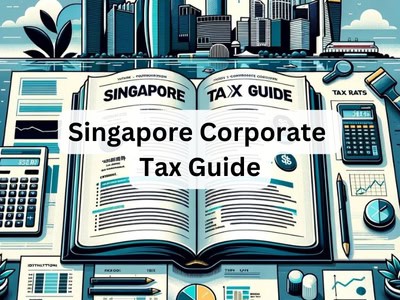This post is also available in:
简体中文 (Chinese (Simplified))
Singapore Corporate Tax Guide

The corporate income tax rate is fixed at a flat rate of 17% since 2010. The calculation is done based on the company’s taxable income, for example taxable revenues less allowable expenses and other allowances. There is no tax on capital gains in Singapore (examples of capitals gains are gains on sale of fixed assets, gains on foreign exchange on capital transactions, etc.)
Effective Corporate Tax Rate for New Companies (FY 2017)
1. Start-up Tax Exemption (SUTE) scheme for Singapore Companies
The eligibility conditions include:
i. no more than 20 individual shareholders
ii. one individual must hold at least 10% of the issued shares (in the case of corporate shareholders)
iii. Property and investment holding companies are not eligible
Though SUTE has been extended to include companies by guarantee since 2010, the tax exemption scheme for new start-up companies is not extended to investment holding companies and companies engaged in property development activities that are incorporated after February 2013.
2. Partial tax exemptions (FY 2017)
Partial tax exemptions are opened for all other companies that do not qualify under the SUTE scheme.
3. Corporate income tax (CIT) rebate
In order to help business to deal with rising costs, cope with the economic uncertainty and continue restructuring, all companies (with Singapore company tax number) are eligible for corporate income tax rebate where the CIT Rebate cap for YA 2017 will be increased from $20,000 to $25,000. The rebate percentage will remain at 50% of the corporate tax payable. Furthermore, the CIT rebate will be enhanced and extended as follows:
a) For YA2018, the CIT rebate will be enhanced to 40% of tax payable, with enhanced cap at $15,000
b) The CIT rebate will be extended for another year to YA2019, at a rate of 20% of tax payable, capped at $10,000
4. Exemption clauses for foreign sourced income of companies
Foreign sourced income remitted to Singapore is taxable In Singapore. However, companies can benefit from the foreign sourced income exemption scheme (FSIE) as detailed in Sections 13 (7A) to 13 (11) of the Income Tax Act (ITA) of Singapore. (Please note that the exemptions apply only when the headline corporate tax rate in the foreign country from which the income is received is at least 15%, and the income had already been subjected to tax in that particular country)
The category of foreign sourced income:
i. Foreign sourced dividend –A foreign-sourced dividend, if it is paid by a non-Singapore tax resident company.
ii. Foreign branch profits – Any profits generated by a Singapore company registered as a branch in a foreign country. It does not apply to non-trade or non-business income of the foreign branch.
iii. Foreign-sourced service income – Any incomes generated by a resident taxpayer for services provided through a fixed place of operation in a foreign country.
5. Double Taxation
Double taxation will happen when foreign sourced income of a Singapore tax resident company is taxed overseas and when the income is remitted into Singapore. However, the company can claim a credit for the tax paid in the foreign country against the Singapore tax that is payable on the same income under the foreign tax credit (FTC) scheme by the Inland Revenue Authority of Singapore (IRAS).
Two types of credit or relief available:
i. Double tax relief (DTR) – Singapore has signed over 20 Free Trade Agreements (FTAs), and 74 comprehensive and 8 limited Avoidance of Double Tax Agreements (DTAs), in order to facilitate trans-border trade and make the cost of expanding overseas cheaper for Singapore-based firms. Therefore, a DTR is the credit relief provided under DTAs to counter double taxation scenarios.
ii. Unilateral tax credit (UTC) – In the city-state with no DTA, UTC is allowed when repatriated income is generated by:
- income from professional, consultancy and other services
- royalty income
- dividends income
- employment income
- branch profits
6. Singapore FTC Pooling System
Introduced in 2011, the FTC pooling system aims to give businesses greater flexibility in their FTC claims, decrease the taxes payable on foreign sourced income, and to simplify tax compliance. Similar to FSIE, FTC applies when the headline corporate tax rate in the foreign country (the source of the foreign income) is at least 15%, and the income has been taxed in that particular country.



